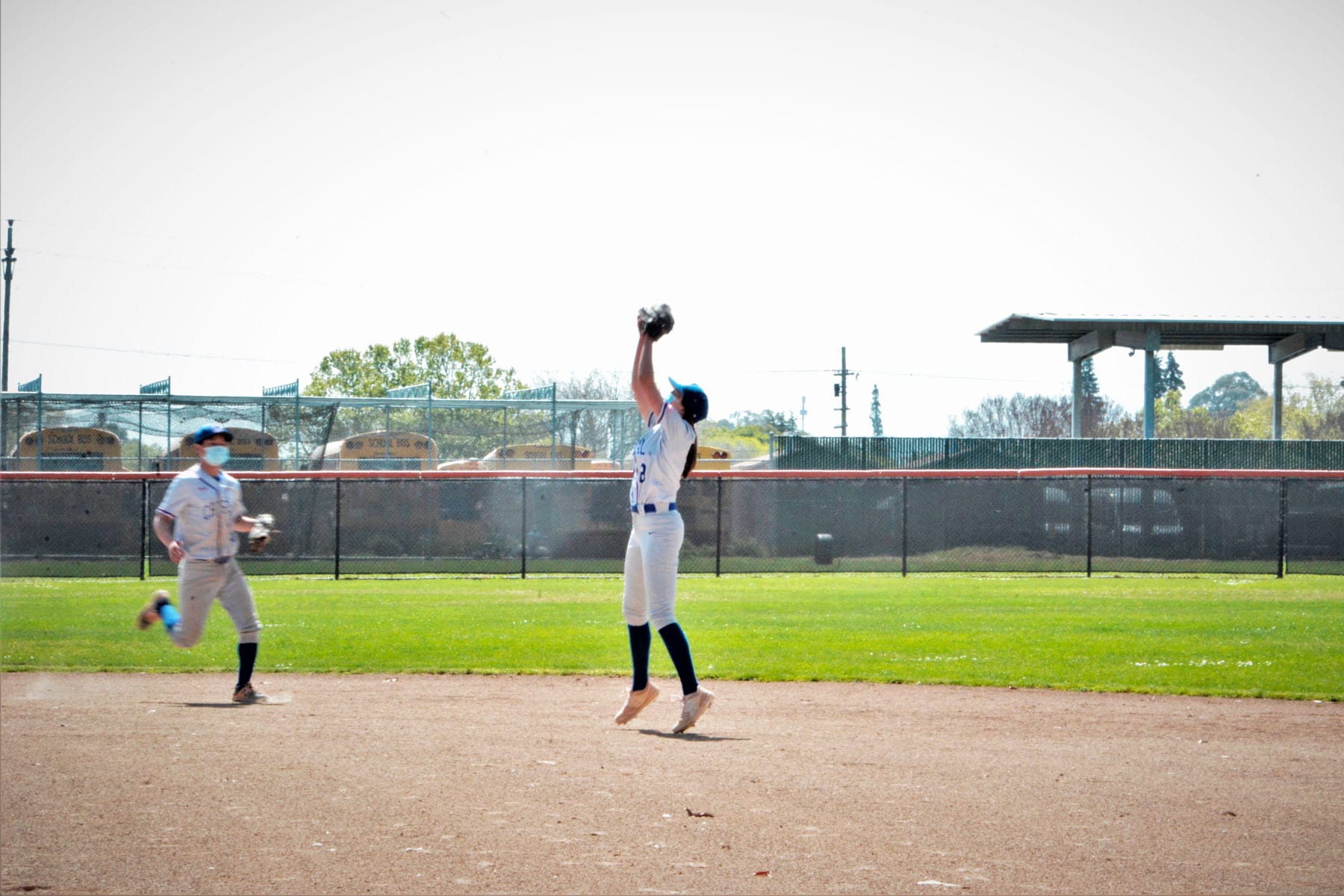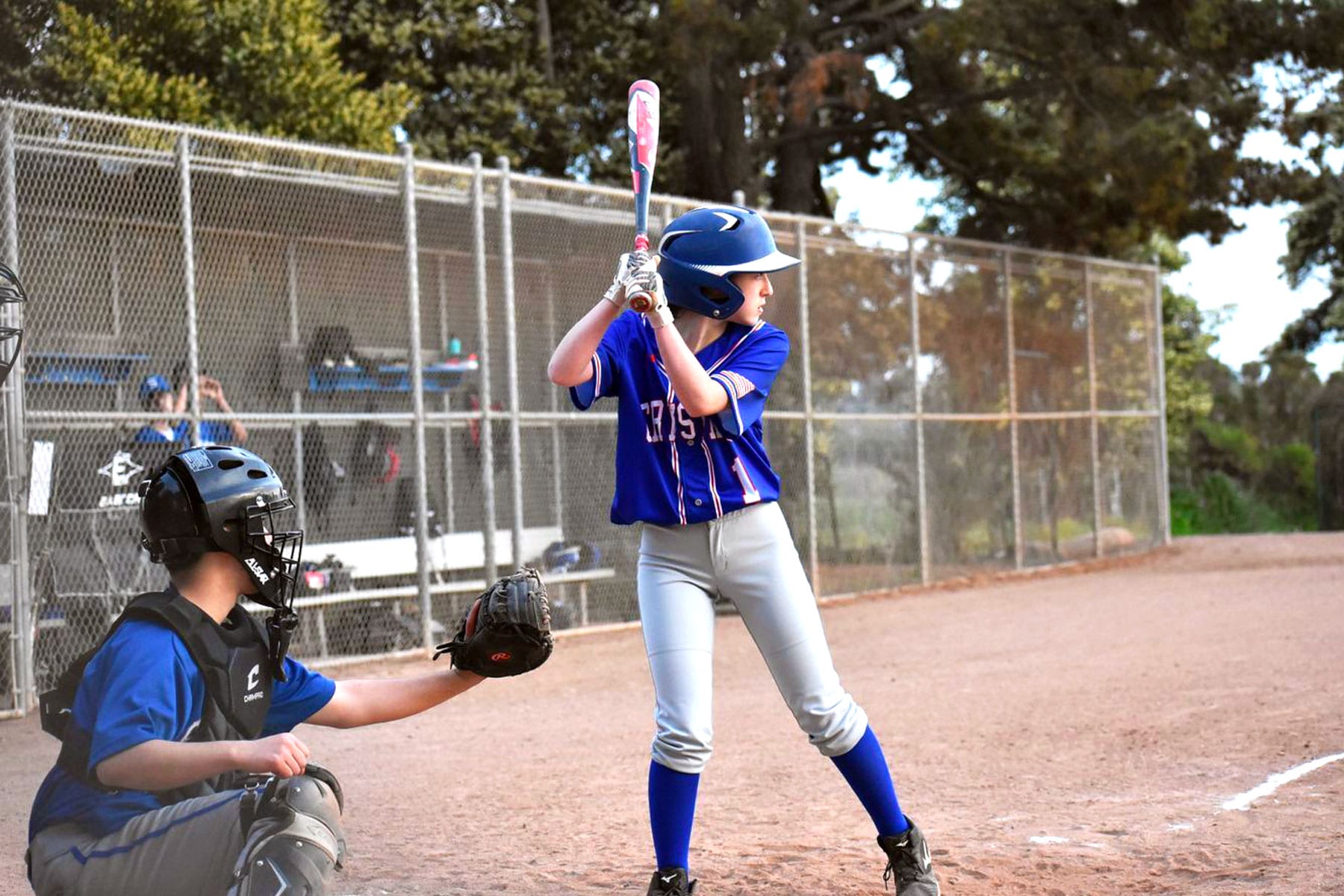For Ashley Stewart, Eliza Schnitzer and Maddie Etheridge, April 10 was a different kind of ball game.
The three Bay Area teenagers hold an unusual role: as young women athletes on their high schools’ baseball teams. Typically, high school sports have put girls in softball and boys in baseball, though players can request to be placed in the other sport, thanks to gender equity protections from the federal Title IX rule. (The divide goes back more than a century, with roots in sexist beliefs that women were not strong enough for baseball.)
Stewart, 15, is a pitcher and catcher at San Mateo High School. Schnitzer, 16, plays middle infield at Crystal Springs High School. Etheridge, 18, plays second base on the same team. And last weekend, the two schools’ squads faced off — one of the few times the three teens had played against a team with another young woman.
The players spoke by phone with The 19th after Saturday’s game, which San Mateo won 3-2 after going into extra innings.
This conversation has been edited for length and clarity.
The 19th: What did it feel like to play this game and to see so many other young women on the field?
Maddie Etheridge: It was really awesome when we heard Ashley plays for San Mateo. Last year, we only played four games, because the season got cut short. But all four games, we were the only girls on the field.
I was super excited when I heard there would be another girl, that it wasn’t just Crystal. It was almost inspiring — I was hyped up for the game.
Ashley Stewart: I’m used to being the only girl on the field, but it’s always nice to play with other girls.
The last game in the season against — I don’t remember who — there was another girl I had met at a girls’ baseball thing. It’s always cool to do that and see other people like me.
Eliza Schnitzer: Same with Maddie, I had never really played against any other girls. It was just really fun knowing there was going to be another girl on the team and getting to meet Ashley afterwards.
How did you all get into baseball?
Schnitzer: I’ve played club softball most of my life, but when I came to Crystal [Springs High School] last year as a freshman, I found out Crystal wasn’t going to continue to have a softball team. Our athletic director basically gave us the option to play for the baseball team, and it was very new, but I just decided to do it anyway. And I ended up really enjoying it.
Etheridge: I played T-ball when I was 4 — that was the last time I played with boys. And then I played youth softball, club softball and the like. The first two years I was at Crystal we had a softball team.
But then, like Eliza said, last year we weren’t able to have enough people to field a team. Me and a couple of other girls who loved softball, we would hold meetings — we were trying really hard to get a softball team together, but there just weren’t enough people.
We found out in October 2019 we weren’t going to have a team, and we were talking to the athletic director about other options, and we brought up playing baseball.
He was like, “Oh, I never thought about that, but I guess there’s no reason why not.”
Everyone was really supportive of us being on the team. No one had any issues. For me it was a little nerve-wracking — I get stressed easily — but it was so smooth, everyone was so excited. It was my first time playing baseball last year, but it was fun.
Stewart: I have been playing baseball my whole life. There is a softball team at San Mateo, but I started playing baseball because my brother did, and he’s four years older. For me, in my 5-year-old brain, it made more sense to go to t-ball rather than softball. So I played through Little League and then just continued to like baseball better than softball. I just stuck with it, and now I’m here.
What’s it like being a young woman in a sport where teams are generally all young men?
Etheridge: It was a bit of an adjustment at first — getting in a mindset like, “OK, it’s not some of my best friends, it’s a whole new team and new sport.” But once I started going to practice and getting past my nerves it ended up being super fun. The coach and people on our team were very supportive. People I don’t usually talk to at school or wouldn’t normally play a sport with I talk to all the time now.
You can tell you’re the only couple of girls there. It’s obvious. But after you get in the right mindset and are OK, it’s really fun. Having a new sport is really fun.
Schnitzer: I think I had honestly psyched myself out about playing on a team with boys. I was so nervous about it.
But when I got out there, everyone was so supportive — the boys and team and coach and everything. It ended up being an easy transition. It was so much easier than I expected.
Stewart: It wasn’t like I had the nerves of a transition when I started high school, because I had been playing for so long and I was used to it. But it’s always been super nerve-wracking playing on a new team.
I want to ask about the disparities we often see between how women’s sports leagues and men’s leagues are treated — a really recent example being the two NCAA basketball tournaments. As young athletes, what was it like to watch that?
Etheridge: It was disheartening. I saw photos of the difference between the men’s weight room and women’s weight room, and the food. It was clear the men’s tournament was better funded.
It was upsetting the only reason it changed was because people were calling out the NCAA. It was nice to see people getting so super up in arms about that, and sticking up for the women’s tournament and demanding they have equal resources that the men were provided with.
Schnitzer: It was upsetting especially as a female athlete just to see the differences in how each team was being treated. It was great people were speaking up about it.

As young women who play baseball, do you all sort of see or experience those same kinds of differences? What is it like?
Schnitzer: Playing for Crystal, everyone has been so supportive that it hasn’t affected me personally at the moment. But I think definitely seeing it in the media and college basketball and things like that — it was upsetting and it definitely does affect many female athletes.
Stewart: I’ve been lucky to have a supportive environment, but at the same time, when I was 12, I went to a tournament in Cooperstown [New York] and I was the only girl out of the 100 teams that were there. It was cool, but it did make me feel a little different — it made me second guess why I was going there.
Seeing the media coverage helps me feel like there’s a reason I’m still playing baseball. Seeing the Giants have a female coach in the spotlight — I know there’s more and more females working behind the scenes, but there aren’t as many in the spotlight.
Etheridge: Playing softball all my life, I’ve never thought about gender as an issue. But definitely leading up to baseball I was worried if people would be mad I was on the team. I didn’t want to cause any controversy.
But there weren’t any issues. It ended up being really great, and I’m super thankful. I know for other women in male-dominated sports it may not be the same experience. We’ve been really lucky.
I’m curious if you’ve been following the efforts in some states to restrict who can play on high school girls’ sports teams, to ban transgender girls. What’s it like to watch that conversation?
Stewart: Trans women should be able to play women’s sports because they are women.
Etheridge: I agree with Ashley. I don’t see why there should be a reason they shouldn’t be allowed. If they identify as women, why can’t they play in women’s sports? The debates I’ve seen, I feel like it’s reversing all the progress that’s been made up until 2021.
Schnitzer: It just goes against everything we’ve worked toward in order for trans people to have equal rights. There’s just no reason they shouldn’t be included in women’s sports. It seems so unfair — if they identify as women, they should be able to compete in women’s sports with other women.
When we think about the future of women’s sports and how they’re treated by society, what would you hope for?
Etheridge: I really am hoping that in the future there’s equal coverage of women’s sports to men’s sports. With the NCAA tournament it was sad to see how large media coverage for the men’s was, and the small amount of attention women got compared to that.
I’m hoping to see that level of attention and budgets put toward women’s sports in an equal way to men’s sports.
Stewart: I don’t even know the name of the closest WNBA team. If someone asked the NBA team, I’d say the Warriors. There’s just not enough. What I’d look for is equal media coverage.
Schnitzer: I totally agree — equal respect, equal coverage, equal funding.






